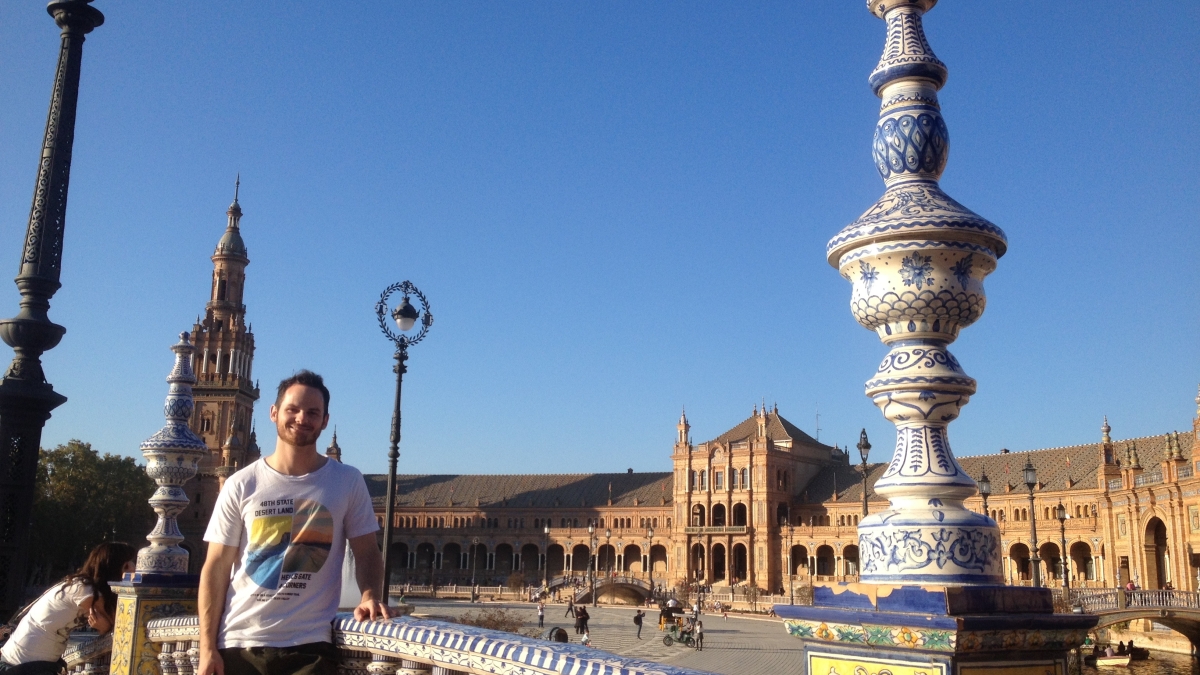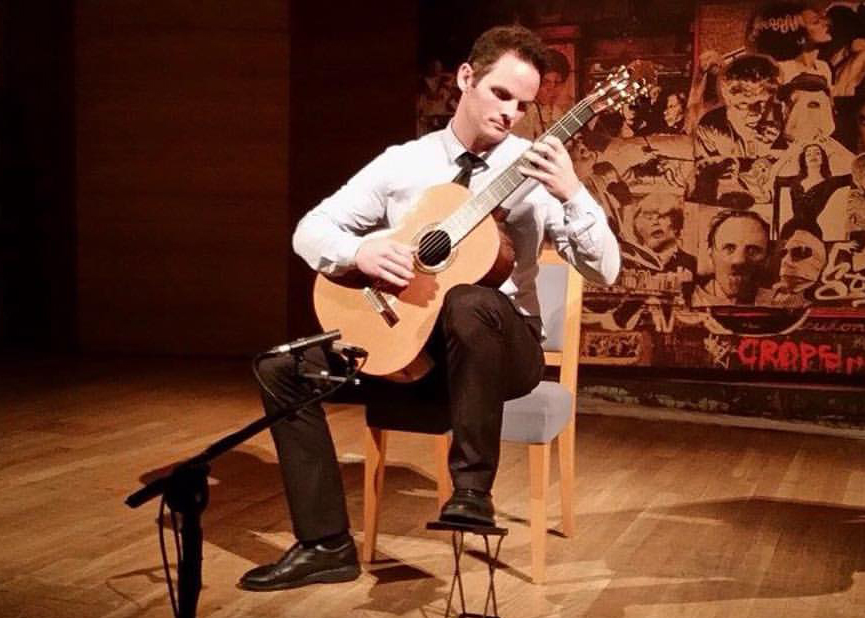Jaxon Williams has spent years honing his skill in classical guitar.
And the best way to make the passion of his life become his career was to spend time in the hub of classical guitar, which is Seville, Spain.
Williams was awarded a Fulbright grant and is now pursuing his master’s degree in Spanish classical and flamenco guitar.
“I've always felt that to reach the next level as a musician, I need to live abroad and connect with the classical guitar's roots, which are in Spain,” said Williams, who is originally from Ashland, Ore.
“Much of this music is passed on orally and in person, so it's very hard to learn these things outside of Spain.”
Williams, who earned a bachelor’s degree at ASU in music and guitar performancefrom the School of Music in the Herberger Institute for Design and the Arts, has played concerts at historic venues in Seville, such as the Real Alcazar, an ancient palace built by Moorish kings.
“To be able to play concerts in places with such a rich history — and often playing music inspired by that very history — is an incredibly gratifying experience,” he said.
He answered a few questions about his year abroad:
Question: Can you give an overview of your project in Spain?
Answer: I study in an international master's program with five of the world's best international concert artists, and at a flamenco school with some of the best flamenco teachers in Seville. My goal is to take my knowledge of Spanish music to the USA, where there is a surprising lack of resources for learning it.
I live in Seville, which is in Andalusia, which is the heart of flamenco music and also is a classical guitar hub.
Q: What is a typical day like for you?
A: On an average day, I practice guitar for a few hours in the morning, go to performance or flamenco classes in the afternoon, practice more in the evening, and then hang out with my roommates (who are Spaniards) or go out in the city with friends.
Q: What do you do on the weekends?
A: One day every weekend, we have a master teacher fly in from another country. These are the most exciting classes because the guitarists are famous international concert artists. The other master’s students and I spend about 10 hours with them doing lessons, lectures and just talking.
Besides that, I take advantage of weekends to travel to other parts of Andalusia, or I stay in town and spend time with friends I've made here. One of my favorite activities is going to local flamenco bars in the Triana area of Seville. These bars have live flamenco music that is never planned or publicized and it’s an organic, fun atmosphere with guitar, singing and dancing. The audience often participates with clapping rhythm, shouting praises during exciting parts of songs, and even getting up and dancing!
Jaxon Williams performs in Spain. He is studying flamenco and classical guitar in Seville after winning a Fulbright grant.
Q: Have there been any challenges?
A: Working out the visa was a big challenge, but once that was set, everything in Andalusia is so relaxed that life is great. Getting used to the siesta has also been interesting. The whole world shuts down in the afternoon for about three hours and you can't stop it, so you just have to accept it and learn to love it!
Q: Has anything funny happened during your adventure?
A: One of my favorite stories is of my first concert in Spain. I was playing in the Sala Joaquin Turina as part of the Sevilla Guitar festival. There were probably 200 people in attendance and the atmosphere was very professional since the festival is a big deal and the venue is one of the top classical venues in the city.
I was not used to Spanish audiences, who are much more vocal and open than we are in the United States. Audience members will cheer, yell things when you do well, and even try to talk to performers while they're on stage.
I remember announcing my pieces and a group of older ladies were very impressed with my Spanish and yelled "Your Spanish is incredible!" I laughed and said thanks from the stage, and then another older lady, probably in her 70's yelled "Oh, if only I were still single!", to which I and the whole audience laughed. I think we can learn a lot from the fun and excited atmosphere of Spanish audiences!
Q: What will you bring back from your experience that will help you in your career — or your life?
A: I think the most important thing I'll take back from the experience is a knowledge of Spanish music that would've been impossible to acquire without this experience. My goal is to one day be a professor of guitar at the university level and I hope to be able to pass the knowledge I've gained on to my students.
Since I'm heavily involved in performing while here, I think I've gained skills that will really improve my career as a concert artist as well.
Lastly, the experience of living abroad and really assimilating into a distinct culture has been incredible. I've learned and grown so much from really adopting the culture of Andalusia as my own and have a much more developed life and world perspective as a result.
Q: What’s next for you, after you return?
A: I will be starting a doctorate program in the fall, finishing my guitar studies. I'm also running an organization that helps find paid performances for ASU musicians called UniversityGigs.com.
I also plan to perform as much as possible and try to start building a name for myself as a concert artist.
Q: What would you tell someone who is contemplating applying for a Fulbright?
A: I would encourage everyone to look into it. There are so many possibilities of things to study for a Fulbright, and it's a great opportunity to combine your passion and your career!
Second, once you start the process, don't give up. The application process is so rigorous that not many make it through, but if you push through, diligently edit your drafts and keep getting feedback from ASU's scholarship office, you are very likely to succeed.
You can't possibly imagine what your Fulbright will be like (and you'll likely have to pivot from what you initially thought you'd be doing), but if you push through, it will be one of the greatest experiences of your life.
More Local, national and global affairs

Military program leaders learn about breadth of ASU's defense-focused initiatives
Arizona State University seeks to be the U.S. military’s top partner in strategic learning and innovation. To advance this vision, the Office for Veteran and Military Academic Engagement hosted…

Expert discusses America's place in outer space with ASU students
If you asked Esther Brimmer about what security issue the United States should focus on next, she might say the moon. In fact, that’s exactly what she recently told a student at an event hosted by…
Arizona nonprofits eager for guidance to address changing federal policies, ASU report finds
In the weeks following a series of executive orders reducing federal funding, including grants to nonprofits, Arizona State University’s Lodestar Center for Philanthropy and Nonprofit Innovation…



